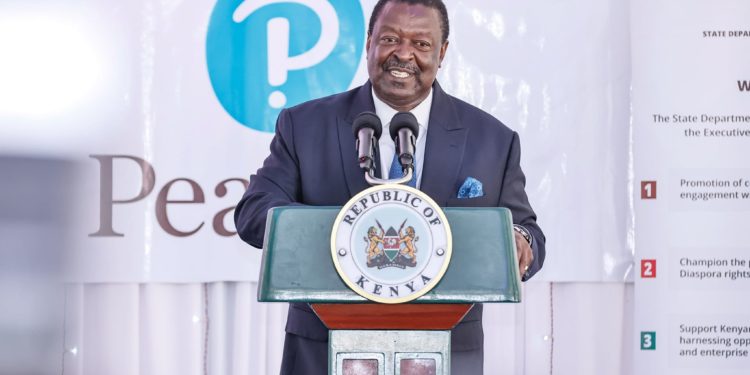Kenya is planning to issue a novel dollar bond that will target its citizens living abroad, as part of its efforts to boost its economic and social transformation.
The bond, which will be structured by the World Bank’s Multilateral Investment Guarantee Agency (MIGA) and the National Treasury, will offer better returns than interest rates in the source markets for Diaspora remittances, according to Prime Cabinet Secretary and Cabinet Secretary for Foreign and Diaspora Affairs Musalia Mudavadi.
Mudavadi, who announced the plan after meeting with MIGA’s Executive Vice President Hiroshi Matano in the US, said the bond would also help the government diversify its public debt mix and reduce its exposure to costly commercial debt.
“We are working on a secure bond that will enable the government to tap into the huge savings potential of our Diaspora community, while offering them an attractive investment opportunity,” he said.
MIGA estimates that while Kenyans abroad remit over $4.3 billion back home annually, their savings in foreign banks could be similar or even more.
Mudavadi also held talks with other US development finance institutions, such as the Development Finance Corporation (DFC) and the Millennium Challenge Corporation (MCC), on potential investments for enhancing the government’s economic and social transformation agenda.
He urged DFC to invest in projects with high multiplier effects, such as infrastructure, manufacturing and supply chain diversification, that would unlock Kenya’s potential as a regional logistics hub for the United Nations operations and global investors in the Eastern Africa region.
He also discussed with DFC the possibility of supporting climate-friendly initiatives, such as smart agriculture, clean energy and electric vehicles, that would promote green growth and reduce carbon emissions.
One of the projects that DFC is already backing is a pyrethrum processing plant in Nakuru County, which has stimulated pyrethrum farming and created opportunities for local farmers to improve their livelihoods and enhance Kenya’s export potential for organic pesticides.
Another meeting between Mudavadi and Chidi Blyden, Deputy Chief Executive Officer of MCC, focused on how to expedite the implementation of a transformative urban mobility and growth initiative that will benefit commuters in Nairobi County.
The initiative, funded by a $60 million MCC grant, includes the development of a Bus Rapid Transit (BRT) network, bicycle lanes and pedestrian pathways, crossways and overpasses, that will improve the accessibility and safety of urban transport.
It will also facilitate the connectivity of matatu stops to the emerging commuter rail network and promote the mobility of women in urban areas.
MCC, an independent US government agency, signed a threshold program agreement with the National Treasury in New York in September 2023.
The initiative will reduce commuter time, hence, promote economic growth through increased productivity of workers and manufacturing firms.
Mudavadi said the government was committed to working with its development partners to leverage green finance and innovative solutions to achieve its vision of a prosperous and inclusive Kenya.


















